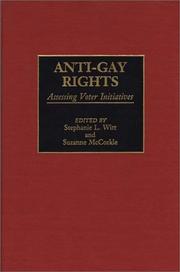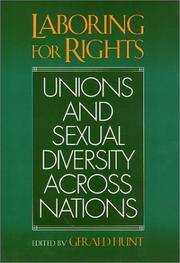| Listing 1 - 10 of 326 | << page >> |
Sort by
|
Book
ISBN: 2081466694 Year: 2017 Publisher: Paris ( ) : Flammarion,
Abstract | Keywords | Export | Availability | Bookmark
 Loading...
Loading...Choose an application
- Reference Manager
- EndNote
- RefWorks (Direct export to RefWorks)
Les homosexuels peuvent se marier à Johannesburg et à Mexico, mais pas à Berlin ni à Rome. En Iran, ils risquent la pendaison alors que les transsexuels se font opérer légalement. En Chine, ils sont des millions à fréquenter les réseaux sociaux gays, mais les militants sont harcelés. Dans huit pays les homosexuels risquent la peine de mort?; dans soixante-seize, la prison.Pourtant, sur tous les continents, la révolution gay est en marche. Un jour l'homosexualité sera peut-être moins pénalisée que l'homophobie.La mondialisation de la question homosexuelle est un phénomène majeur. Pendant huit ans, dans cinquante pays, Frédéric Martel a mené une enquête de grande ampleur et rencontré sur le terrain des centaines d'acteurs de cette révolution. À travers le prisme gay, il analyse la mutation des modes de vie, la redéfinition du mariage, l'émancipation parallèle des femmes et des gays, les effets décisifs de la culture et d'Internet. Fil rouge de l'évolution des mentalités, la question gay et lesbienne est un critère pertinent pour juger de l'état d'une démocratie et de la modernité d'un pays. Ce livre, à la fois inquiet et optimiste, riche en portraits inattendus, raconte la nouvelle bataille des droits de l'homme.Nouvelle édition entièrement mise à jour.
Book
Year: 1996 Publisher: Washington, District of Columbia : Library of Congress, Congressional Research Service,
Abstract | Keywords | Export | Availability | Bookmark
 Loading...
Loading...Choose an application
- Reference Manager
- EndNote
- RefWorks (Direct export to RefWorks)
The U.S. Supreme Court this term in Romer v. Evans , decided 6 to 3 that the State of Colorado violated the right of lesbians and homosexuals to Equal Protection of the Laws when it adopted, by voter referendum, Amendment 2 to the State Constitution. That amendment rescinded various state and local laws prohibiting discrimination on the basis of "homosexual, lesbian or bisexual orientation" and barred the statutory enactment of any such civil rights protection in the future. Justice Kennedy's majority opinion affirmed the judgment but not the rationale of the Colorado Supreme Court which had applied "strict scrutiny" to invalidate Amendment 2 based on a "fundamental rights" analysis. Instead, the Kennedy-led majority applied a "rationality" standard to hold that the "broad and undifferentiated disability of a single named group" was irrational and could not be justified by any legitimate state interest. Bowers v. Hardwick was not mentioned by the Romer majority. In Bowers , a decade earlier the Court refused, by a 5 to 4 vote, to find that any constitutionally recognized "liberty" interest was contravened by a Georgia State law penalizing homosexual sodomy. Bowers was a "conduct" case seeking, in effect, due process protection from state prosecution for homosexual acts rather than safeguards against discrimination by the state based on sexual "orientation." The comprehensive nature of the legal disability visited upon the "isolated group" disadvantaged by Amendment 2, and the "unique" circumstances of its enactment, may also serve to distinguish and diminish the force of Romer in other legal and statutory contexts. The possible fragility of the Bowers precedent, and Romer's silence as to its status, could lead to future litigation on a variety of fronts.
Book
Year: 1996 Publisher: Washington, District of Columbia : Library of Congress, Congressional Research Service,
Abstract | Keywords | Export | Availability | Bookmark
 Loading...
Loading...Choose an application
- Reference Manager
- EndNote
- RefWorks (Direct export to RefWorks)
The U.S. Supreme Court this term in Romer v. Evans , decided 6 to 3 that the State of Colorado violated the right of lesbians and homosexuals to Equal Protection of the Laws when it adopted, by voter referendum, Amendment 2 to the State Constitution. That amendment rescinded various state and local laws prohibiting discrimination on the basis of "homosexual, lesbian or bisexual orientation" and barred the statutory enactment of any such civil rights protection in the future. Justice Kennedy's majority opinion affirmed the judgment but not the rationale of the Colorado Supreme Court which had applied "strict scrutiny" to invalidate Amendment 2 based on a "fundamental rights" analysis. Instead, the Kennedy-led majority applied a "rationality" standard to hold that the "broad and undifferentiated disability of a single named group" was irrational and could not be justified by any legitimate state interest. Bowers v. Hardwick was not mentioned by the Romer majority. In Bowers , a decade earlier the Court refused, by a 5 to 4 vote, to find that any constitutionally recognized "liberty" interest was contravened by a Georgia State law penalizing homosexual sodomy. Bowers was a "conduct" case seeking, in effect, due process protection from state prosecution for homosexual acts rather than safeguards against discrimination by the state based on sexual "orientation." The comprehensive nature of the legal disability visited upon the "isolated group" disadvantaged by Amendment 2, and the "unique" circumstances of its enactment, may also serve to distinguish and diminish the force of Romer in other legal and statutory contexts. The possible fragility of the Bowers precedent, and Romer's silence as to its status, could lead to future litigation on a variety of fronts.
Book
Year: 1996 Publisher: Washington, District of Columbia : Library of Congress, Congressional Research Service,
Abstract | Keywords | Export | Availability | Bookmark
 Loading...
Loading...Choose an application
- Reference Manager
- EndNote
- RefWorks (Direct export to RefWorks)
The U.S. Supreme Court this term in Romer v. Evans , decided 6 to 3 that the State of Colorado violated the right of lesbians and homosexuals to Equal Protection of the Laws when it adopted, by voter referendum, Amendment 2 to the State Constitution. That amendment rescinded various state and local laws prohibiting discrimination on the basis of "homosexual, lesbian or bisexual orientation" and barred the statutory enactment of any such civil rights protection in the future. Justice Kennedy's majority opinion affirmed the judgment but not the rationale of the Colorado Supreme Court which had applied "strict scrutiny" to invalidate Amendment 2 based on a "fundamental rights" analysis. Instead, the Kennedy-led majority applied a "rationality" standard to hold that the "broad and undifferentiated disability of a single named group" was irrational and could not be justified by any legitimate state interest. Bowers v. Hardwick was not mentioned by the Romer majority. In Bowers , a decade earlier the Court refused, by a 5 to 4 vote, to find that any constitutionally recognized "liberty" interest was contravened by a Georgia State law penalizing homosexual sodomy. Bowers was a "conduct" case seeking, in effect, due process protection from state prosecution for homosexual acts rather than safeguards against discrimination by the state based on sexual "orientation." The comprehensive nature of the legal disability visited upon the "isolated group" disadvantaged by Amendment 2, and the "unique" circumstances of its enactment, may also serve to distinguish and diminish the force of Romer in other legal and statutory contexts. The possible fragility of the Bowers precedent, and Romer's silence as to its status, could lead to future litigation on a variety of fronts.
Book
Year: 2022 Publisher: Pretoria : Pretoria University Law Press (PULP),
Abstract | Keywords | Export | Availability | Bookmark
 Loading...
Loading...Choose an application
- Reference Manager
- EndNote
- RefWorks (Direct export to RefWorks)
"This book focuses on the strategies that activists for LGBTIQ+ equality in Africa deploy to challenge deep seated homophobia and transphobia, as well as the politicisation of LGBTIQ+ issues. It is a peer-reviewed, edited volume with scholarly contributions from lawyers, anthropologists, and LGBTIQ+ activists. It covers different country situations - those where equality is taking root, as the case is in South Africa, Botswana and Mozambique; those where homophobia reigns and LGBTIQ+ rights are politicised such as, Ghana, Kenya, Malawi, Nigeria, Senegal, Uganda, and Zambia; and those where traditional LGBTIQ+ activism is almost a nonstarter, such as in Ethiopia, Sudan and The Gambia."

ISBN: 0275954617 Year: 1997 Publisher: Westport (Conn.): Praeger
Abstract | Keywords | Export | Availability | Bookmark
 Loading...
Loading...Choose an application
- Reference Manager
- EndNote
- RefWorks (Direct export to RefWorks)
Gay rights --- Referendum
Book
Year: 2022 Publisher: Pretoria : Pretoria University Law Press (PULP),
Abstract | Keywords | Export | Availability | Bookmark
 Loading...
Loading...Choose an application
- Reference Manager
- EndNote
- RefWorks (Direct export to RefWorks)
"This book focuses on the strategies that activists for LGBTIQ+ equality in Africa deploy to challenge deep seated homophobia and transphobia, as well as the politicisation of LGBTIQ+ issues. It is a peer-reviewed, edited volume with scholarly contributions from lawyers, anthropologists, and LGBTIQ+ activists. It covers different country situations - those where equality is taking root, as the case is in South Africa, Botswana and Mozambique; those where homophobia reigns and LGBTIQ+ rights are politicised such as, Ghana, Kenya, Malawi, Nigeria, Senegal, Uganda, and Zambia; and those where traditional LGBTIQ+ activism is almost a nonstarter, such as in Ethiopia, Sudan and The Gambia."

ISBN: 1566397189 Year: 1999 Publisher: Philadelphia Temple University Press
Abstract | Keywords | Export | Availability | Bookmark
 Loading...
Loading...Choose an application
- Reference Manager
- EndNote
- RefWorks (Direct export to RefWorks)
Book
ISBN: 150996116X Year: 2023 Publisher: London : Bloomsbury Publishing Plc,
Abstract | Keywords | Export | Availability | Bookmark
 Loading...
Loading...Choose an application
- Reference Manager
- EndNote
- RefWorks (Direct export to RefWorks)
This book, edited by Ilias Trispiotis and Craig Purshouse, examines the legal and policy measures necessary to ban LGBTQ+ 'conversion therapy.' It brings together leading academics, legal and medical policymakers, and activists to explore the legislative steps required to protect individuals from the harms of 'conversion therapy' across various contexts. The book addresses complex legal issues related to human rights law, criminal law, family law, and socio-legal studies, highlighting the necessity of legal intervention and offering practical suggestions for legal and non-legal measures to end these practices. It is essential reading for understanding how to combat cruel, inhuman, and degrading treatment in the pursuit of LGBT equality.
Book
Year: 2022 Publisher: Pretoria : Pretoria University Law Press (PULP),
Abstract | Keywords | Export | Availability | Bookmark
 Loading...
Loading...Choose an application
- Reference Manager
- EndNote
- RefWorks (Direct export to RefWorks)
"This book focuses on the strategies that activists for LGBTIQ+ equality in Africa deploy to challenge deep seated homophobia and transphobia, as well as the politicisation of LGBTIQ+ issues. It is a peer-reviewed, edited volume with scholarly contributions from lawyers, anthropologists, and LGBTIQ+ activists. It covers different country situations - those where equality is taking root, as the case is in South Africa, Botswana and Mozambique; those where homophobia reigns and LGBTIQ+ rights are politicised such as, Ghana, Kenya, Malawi, Nigeria, Senegal, Uganda, and Zambia; and those where traditional LGBTIQ+ activism is almost a nonstarter, such as in Ethiopia, Sudan and The Gambia."
| Listing 1 - 10 of 326 | << page >> |
Sort by
|

 Search
Search Feedback
Feedback About UniCat
About UniCat  Help
Help News
News